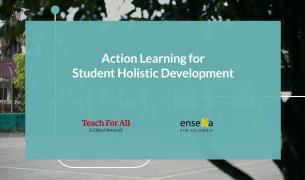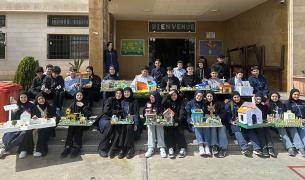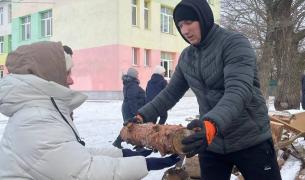Climate Class Connection: Fostering young people’s climate resilience and leadership in Pakistan
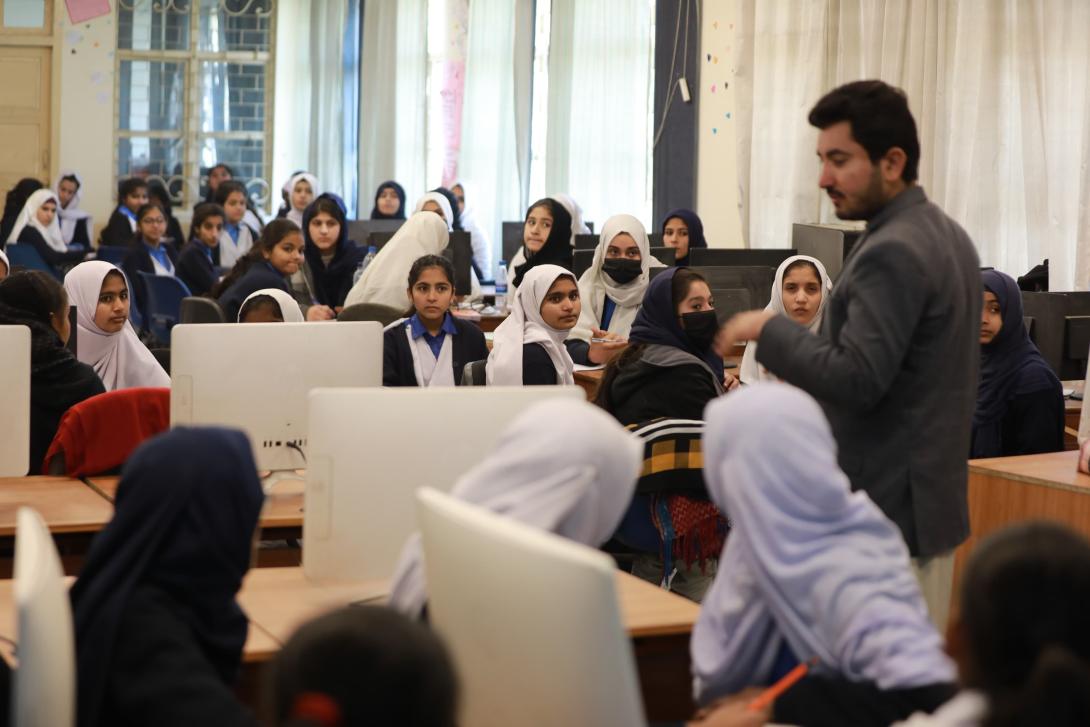
TeachersCOP, organized by the Office for Climate Education (OCE), is an annual international event that highlights the critical role of teachers in addressing the global climate crisis. Educators from the Teach For All network have actively participated in TeachersCOP, showcasing their climate education initiatives to educators and policymakers. In 2022, at the second edition of TeachersCOP, Edson Dongo, a Teach For Zimbabwe alumnus, presented the climate education initiative he led with his students in rural Zimbabwe. In 2023, Esther Gacigi, a Teach For Kenya alumna, shared the climate education work she spearheaded with her students in Nairobi. This year, Sandra Keeru, a Teach For Kenya alumna, and Nouman Alam, a Teach For Pakistan alumnus, shared their inspiring climate education efforts. Sandra presented in the Greening Schools category, where her solution earned the second-highest number of votes in this category. Nouman presented in the Greening Teacher Training category, where his solution received the highest number of votes.
The following is Nouman’s story in his own words:
In 2004, my village, Kaka Khel in Lakki Marwat, Pakistan, was devastated by relentless floods caused by extreme rainfall. Homes were destroyed, crops swept away, rivers polluted, and roads rendered impassable. For my family, the floods also brought an invisible yet profound loss: education.
For my sisters and me, school was disrupted—but the impact on them was disproportionately harsh. As a boy, I had more cultural freedom, which meant I could navigate the hazardous roads to get to school. For my sisters, the situation was different. The only girls’ school was located near the village, but frequent flooding made the journey unsafe, especially for girls who had to walk. Cultural norms and safety concerns further limited their options, as it was considered inappropriate for girls to travel far for education. Over time, these disruptions made it increasingly difficult for my sisters to keep up with their coursework. Without any system for home learning or alternative educational support, they eventually fell behind. By the next academic year, my sisters had to drop out entirely, losing their chance to continue their studies.
This was not just about missing school—it was about losing opportunities and dreams. Watching this unfold in my own family showed me how climate change, when coupled with cultural barriers, disproportionately affects girls’ education. This experience became the driving force behind my commitment to using education as a tool to empower communities and build resilience.
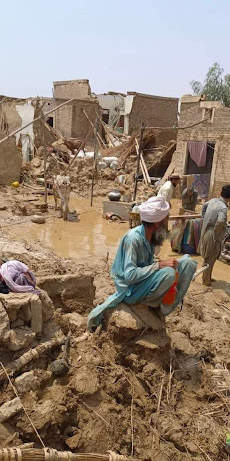 In 2021, I joined Teach For Pakistan to pursue this mission. In the community where I was placed, I saw firsthand how climate change devastates lives, particularly children’s education. The urgency of addressing this became clear during the 2022 floods, which caused catastrophic damage. Over 25,993 schools were destroyed across Pakistan, and more than 7,062 schools were turned into relief camps, disrupting education for 3.5 million children, including 27,000 in refugee villages—most of them girls. According to the Assistant Commissioner of Lakki Marwat, villages like Pai saw 85% destruction, with schools being used as shelters for months. This meant that even more girls continued to miss out on education.
In 2021, I joined Teach For Pakistan to pursue this mission. In the community where I was placed, I saw firsthand how climate change devastates lives, particularly children’s education. The urgency of addressing this became clear during the 2022 floods, which caused catastrophic damage. Over 25,993 schools were destroyed across Pakistan, and more than 7,062 schools were turned into relief camps, disrupting education for 3.5 million children, including 27,000 in refugee villages—most of them girls. According to the Assistant Commissioner of Lakki Marwat, villages like Pai saw 85% destruction, with schools being used as shelters for months. This meant that even more girls continued to miss out on education.
Despite the severe impact of climate change, many students in the community viewed these crises as acts of fate. Even experienced teachers believed that climate action was solely the government’s responsibility, leaving communities feeling helpless.
To address this, I founded Climate Class Connection in 2023 to use education as a tool for fostering climate resilience and leadership in young minds. This initiative stands on four interconnected pillars:
- Empowering Educators and School Leaders
Through specialized training programs, teachers and school leaders are equipped to integrate climate education into lessons using interactive methods like storytelling, games, and outdoor learning. Educators are encouraged to contextualize climate education and engage students in understanding climate impacts in their communities. - Engaging Students
Together with trained educators, we engage students in the process of innovating and developing solutions to climate and environmental challenges in their communities. Students participate in interactive activities such as panel discussions, debates, and creative competitions, which provide platforms for analyzing climate issues, proposing solutions, and developing confidence as leaders. Students are now leading climate action in their communities. - Bridging Communities Together
Parents have become vital partners in climate action. We engage them through community dialogues, where local leaders, parents, teachers, and students collaborate on solutions to specific climate or environmental challenges. Sessions such as mother-student workshops allow families to learn together and adopt sustainable practices at home. - Advocating for Systemic Change
We engage policymakers through workshops and advocacy. Collaborating closely with policymakers has enabled us to scale the initiative to 10 schools across Pakistan, creating a ripple effect of climate-conscious communities. We also share best practices with policymakers by attending international conferences such as Schools2030 and TeachersCOP.
This interconnected model ensures teachers inspire students, students collaborate with parents, and their collective efforts advocate for systemic change, building a movement for sustainable transformation.
The Climate Class Connection initiative has empowered over 1,200 students, including 700 girls, with climate knowledge and leadership skills, turning them into advocates for action. A key achievement is Climate Bethak, where female teachers, students, mothers, and local leaders collaboratively address issues like deforestation, breaking cultural barriers and inspiring collective solutions for resilience and sustainability. We aim to scale to more schools across Pakistan and engage more teachers and students.
My story is just one of many in a country where the climate crisis is rewriting lives every day. Together, we can ensure that no child is forced to abandon their dreams, no teacher feels powerless in the face of adversity, and no family is left vulnerable to the changing climate. I invite educators to become role models and climate leaders in their classrooms, policymakers to prioritize climate resilience in education strategies, and community leaders to amplify voices that are too often silenced. The time to act is now. Together, we can lead the way for a greener, more resilient world—one classroom, one community, and one bold step at a time.
Learn more about Teach For All's Climate Education & Leadership initiative.
